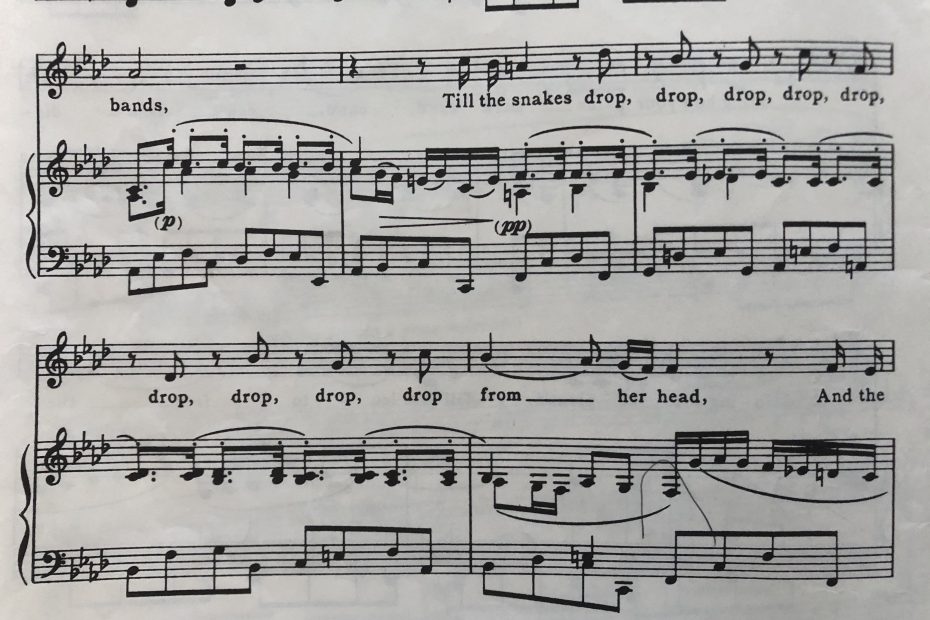Breathing is fundamental to our existence. On average we take 960 breaths an hour. So, if we live to 80 we could have taken 672,768,000 breaths, and that is without taking into consideration the effects of exercise.
For a singer, breath is crucial. Without it there is no instrument. Breath is the energy source of singing. Singers take considerable time learning how to control their breath. We plan when to take a breath. Once we have taken a breath we then may need to be economical in its use so that we can sing to the end of a long phrase. Breath control is fundamental to singing technique.
Breath is also closely connected to emotions. A sigh or a huff can be a clear indicator of how someone is feeling. Sometimes our breathing is affected by how we feel. When I was seventeen I had what I guess you would now call a ‘panic attack’. It only happened once but I remember it vividly. I was sitting alone on my girlfriend’s bed in her home. There was a terrible argument going on in the house between my girlfriend and her father. As I sat there I felt my anxiety welling up. What I hadn’t realised was that the anxiety was engulfing me and I was breathing faster and faster. I was suddenly aware of a numbness coming over my body. My hands became rigid and I couldn’t move them. I was frightened. I didn’t know it, but I was hyperventilating. Luckily, my girlfriend discovered me and immediately got a neighbour who was a doctor to come to my aid. The doctor had me breathe into a paper bag and my breathing returned to normal. I have never had that experience since but I am very aware of when my breathing is affected by my feelings. Sometimes in a concert, if I am feeling nervous or anxious, my breathing is affected for about the first 20 minutes. I find that my muscles are more rigid and that I can’t take as deep a breath as I would like. This was particularly the case at the end of last year when Covid-19 meant that concerts were far fewer and there was anxiety about social distancing and catching the virus. Singers are experts at disguising these emotions and so what the audience sees is often not a true reflection of how the performer might be feeling.
Some composers when writing for the voice are aware that the sound of breath is just as much part of the music as the singing. For example the composer Henry Purcell often utilized the intake of breath to add drama to his music. In Saul and the Witch of Endor, Purcell uses the anxiety and tension of breath in his music to portray Saul’s desperation as he summons the prophet Samuel from the grave in order to discover his fate in battle the next day. “Tell me, tell me!” he exclaims. In the Purcell song Music for a while the quaver rests after the word ‘drop’, which is repeated nine times, not only allow the singer to clearly annunciate the ‘p’ each time, which is an exhalation of breath, but also allows for the singer to inhale which adds a dramatic effect to the music.
Currently the greatest enemy of breath is the Covid-19 virus. At worse, it literally takes our breath away from us. Our hospitals are full of victims of this terrible disease who have completely lost control of their breathing and who are relying on ventilators and oxygen to do the job for them. Long term Covid leaves many with a shortness of breath. Ironically, the virus also relies on breath to continue its existence. It utilizes each exhalation we make as a way of transporting itself to another victim. It is merciless and only seeks to survive and evolve.
Consequently the disease has taken control of our lives. We have to wear masks to prevent this transmission. It disallows us from being close to each other. It has interrupted our work and leisure time. For some it has caused financial ruin. For those who now have to work at home the boundaries between work and leisure time have been broken down. Many of us are feeling trapped and working longer hours. Again, there is a sense of losing control of our lives.
However, if we are to survive these times we need to take back some control. Oddly, part of that control can be taken back through our breathing. My wife was in a training session the other day where a psychotherapist was saying that when we are feeling anxious we need to take a moment to just breathe. To take back control of our breath. Although there are so many things we cannot control at the moment, we can have control over our own breathing to calm us and to bring us into the present so that we do not focus on the possible worries for the future.
Each of us will of course have our own ways of bringing calm into our troubled lives at this time. For some it will be breathing in our exercise. For others it could be through Yoga. For me there is a strong link between music, breath and finding peace. I am reminded of the opening words to Purcell’s song. ‘Music for a while shall all your cares beguile’. Whatever our way of coping, taking time to breathe will help us to bring back that sense of calm.
